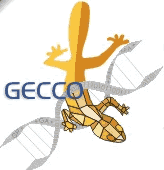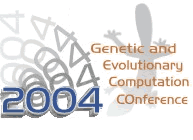

June 26 - 30, 2004
Saturday to Wednesday
Seattle, Washington, USA
Session: |
EEC - Evolvability in Evolutionary Computation |
Title: |
Implications of Incorporating Learning Probabilistic Context-sensitive Grammar in Genetic Programming on Evolvability of Adaptive Locomotion Gaits of Snakebot |
Authors: |
Ivan Tanev |
Abstract: |
In this work we propose an approach of incorporating learning context-sensitive grammar in strongly typed genetic programming (GP) employed for evolution and adaptation of locomotion gaits of simulated snake-like robot (Snakebot). In our approach the probabilistic context-sensitive grammar is derived from the originally defined context-free grammar (which usually expresses the syntax of genetic programs in strongly typed GP), using aggregated reward values obtained from the evolved best-of-run healthy, undamaged Snakebots. The probabilities of applying each of particular production rules with multiple right-hand side alternatives in derived probabilistic context-sensitive grammar depend on the context, and these probabilities are learned from the aggregated reward values. Empirically obtained results indicate that employing probabilistic context-sensitive grammar contributes to the improving the ability of Snakebot to adapt to partial damage by gradually improving its velocity characteristics. Snakebot recovers completely from single damage and recovers a major extent of its original velocity when more significant damage is inflicted. In all considered cases of inflicted partial damage of 1, 2, 4, and 8 out of 15 morphological segments, the incorporation of learning context sensitive grammar in GP improves the evolvability of adaptive locomotion gaits in that the recovery of partially damaged Snakebot is (i) faster and to (ii) higher values of velocity of locomotion. |
HomeProgramSearchAuthor Index
SponsorsCommitteeContact Us
